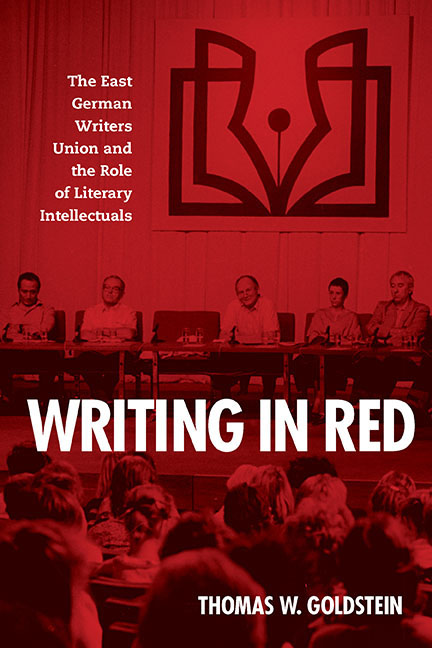Book contents
- Frontmatter
- Contents
- Acknowledgments
- List of Abbreviations
- Introduction
- 1 German Writers Associations through 1970
- 2 Socioeconomic Functions
- 3 The Era of No Taboos? 1971–76
- 4 A Disciplining Instrument, 1976–79
- 5 Defending Peace, Defining Participation, 1979–83
- 6 Years of Resignation, 1983–85
- 7 Glasnost in the GDR? 1985–89
- 8 Coming Full Circle, 1989–90
- Conclusion
- Notes
- Bibliography
- Index
1 - German Writers Associations through 1970
Published online by Cambridge University Press: 24 August 2019
- Frontmatter
- Contents
- Acknowledgments
- List of Abbreviations
- Introduction
- 1 German Writers Associations through 1970
- 2 Socioeconomic Functions
- 3 The Era of No Taboos? 1971–76
- 4 A Disciplining Instrument, 1976–79
- 5 Defending Peace, Defining Participation, 1979–83
- 6 Years of Resignation, 1983–85
- 7 Glasnost in the GDR? 1985–89
- 8 Coming Full Circle, 1989–90
- Conclusion
- Notes
- Bibliography
- Index
Summary
BEFORE THE WRITERS UNION was created there were many German attempts to organize literary professionals to advance their collective economic and professional interests. Others tried to organize authors along ideological lines to work toward societal change. By the time the SV was founded in 1950, East German authors could thus look to examples during the Imperial period, the Weimar Republic, the Third Reich, and the Allied occupation. Of course, the final shape of the union was not a foregone conclusion in 1950; it was the result of a contentious process between writers and the Socialist Unity Party, as the union was not a mere receptor of Kulturpolitik.
In the GDR's first two decades, the SV emerged as an important institution during pivotal moments such as the 1953 uprising, the Bitterfelder Weg movement, the building of the Berlin Wall, and the Prague Spring. In these years, cultural policy oscillated between dogmatism and liberalization, and writers’ responses served as a barometer of these fluctuations. The results were ambivalent; on the one hand, by the late 1960s the SED had largely (if tenuously) taken control of the union and could deploy it to enforce cultural policy. Yet several SV members who were critical of the regime were not effectively silenced; it was these voices who would haunt the SED in the 1970s, utilizing the union to bolster their challenges to the regime to broaden the limits of speech.
In this chapter I focus on four broad periods: the Wilhelmine and Weimar eras; the Third Reich; the time of the Soviet occupation zone; and the GDR's years under Ulbricht. This raises two questions. First, what were the successes and failures of writers’ attempts to organize since the nineteenth century? Second, which lessons learned from these experiences did the founders of the East German Writers Union carry with them? As we will see, the SV drew inspiration from a number of examples, and not always those that aligned ideologically with its members’ beliefs.
Early Writers Associations, 1842–1909
Professional associations became a hallmark of bourgeois life in Germany before the First World War, and organizations for creative intellectuals were no exception. By the late nineteenth century many professions had begun to organize to protect and advance economic and career interests.
- Type
- Chapter
- Information
- Writing in RedThe East German Writers Union and the Role of Literary Intellectuals, pp. 20 - 41Publisher: Boydell & BrewerPrint publication year: 2017



